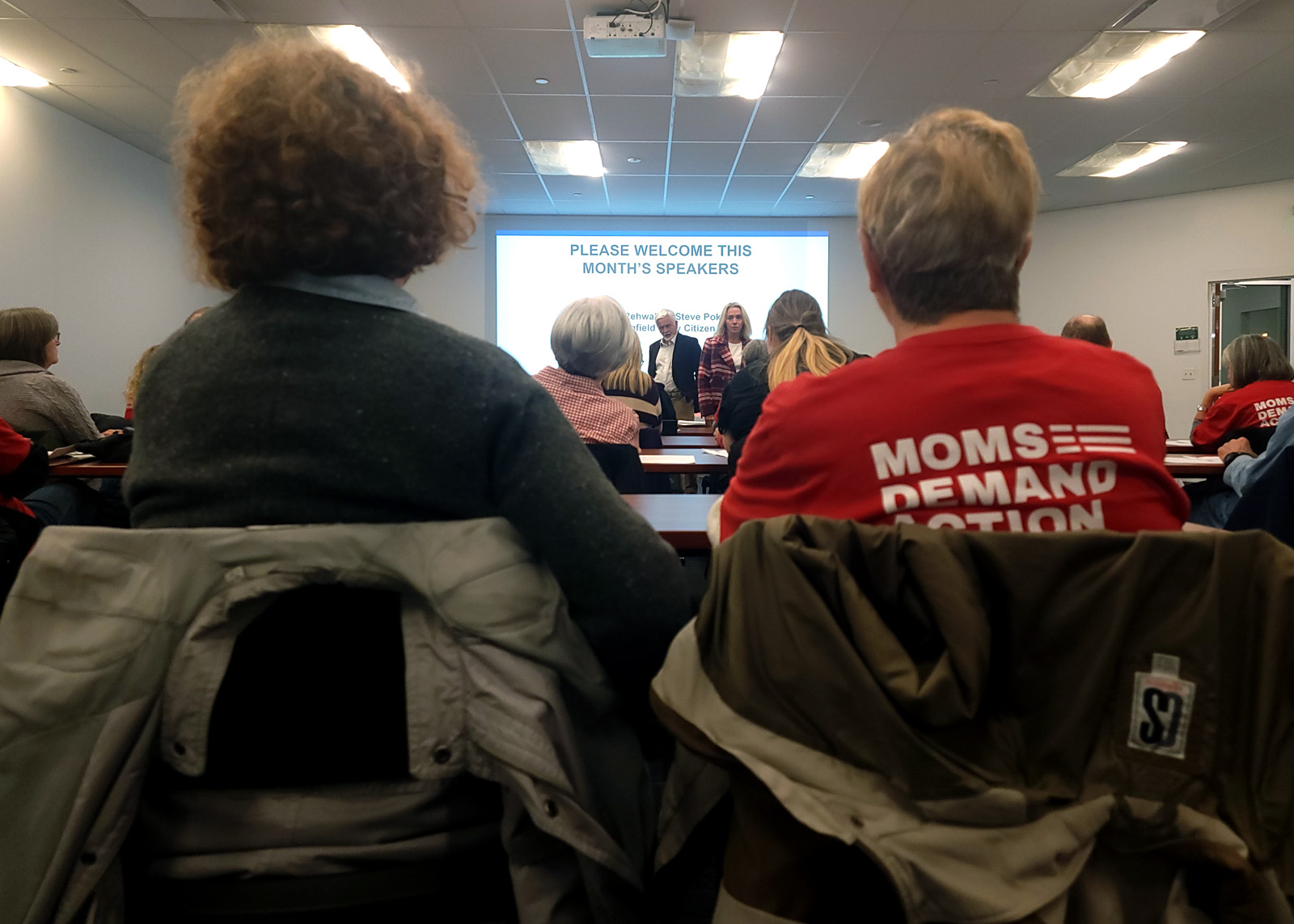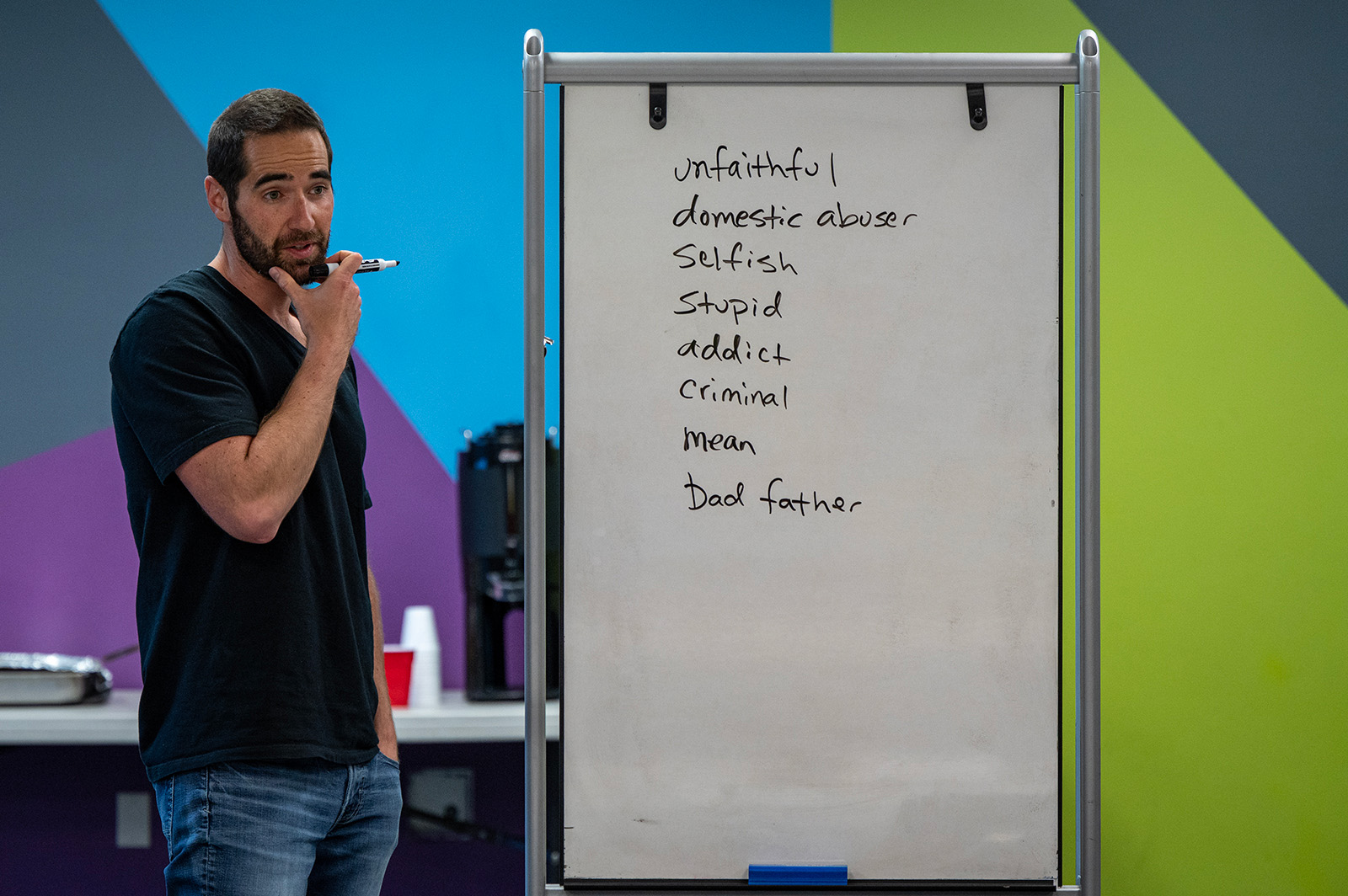OPINION|
On Thursday evening, colleague Jackie Rehwald and I were inundated with questions about domestic violence by members of the Springfield chapter of Moms Demand Action for Gun Sense in America.
They definitely were engaged in the topic.
Jackie and I are not experts on domestic violence, but we spoke to many experts — most of them from Greene County — in reporting the Hauxeda's four-part series “Living in Fear.”
Those four parts amounted to 29 stories; they ran in May and June of 2023.
Twenty-eight people attended. Men and women. You don't have to be a Mom to be part of Moms Demand Action.
The group advocates for stronger laws and policies that would reduce gun violence and increase gun safety. One concern of the organization is the number of young people who end their own lives with guns.
The national organization was created after the Dec. 14, 2012 murders at Sandy Hook Elementary School in Newtown, Connecticut. Twenty-eight people died in connection with the shootings.
Adam Lanza, 20, who lived near the school, first shot and killed his mother. He then shot and killed six adults who worked at the school and 20 grade schoolers ages 6 and 7. Then he took his own life.
We were asked about ‘Living in Fear' series

Jackie and I were asked if we were going to follow-up on the series.
First, we explained, it was a tremendous commitment of resources for the Daily Citizen to devote two reporters to the topic of domestic violence for six months. That is rarely done, especially with news organizations with small staffs, like the Daily Citizen.
CEO David Stoeffler has estimated the production cost of the series at $80,000.
Second, we said, Jackie and I needed to come up for air. We had to have a break from reporting on domestic violence.
I know that I did not want read another probable cause statement — a court document that describes in detail how one intimate partner assaulted, strangled or killed the other intimate partner.
Third, we said, No. We have no definite plan to revisit the issue in detail. The Daily Citizen will be looking at other issues in detail.
Nevertheless, we will continue to report on domestic violence as part of our normal newsgathering. I should add that after the series, we are more aware of the issue of domestic violence and undoubtedly more attune to it when we pursue breaking news.
For example, when I hear a report of a intimate partner murder-suicide, I immediately check court records, because I expect to find a documented history of domestic assault and violated restraining orders.

After “Living in Fear” published
Here's a partial list of the domestic violence stories we've written after the Hauxeda's “Living in Fear” series concluded in June 2023:
Aug. 1: Man with violent history sentenced to 29 years for assault, kidnapping 2021
Sept. 5: Man who beat woman in viral video sentenced to probation, tells judge “That is not who I am'
Sept. 5: Pokin Around: She says church leader once forbade her from going to a shelter for victims of abuse
Sept. 26: Harmony House launching its ICare campaign to raise awareness about domestic violence
Nov. 14: Man who crushed his baby's skull accused of breaking woman's nose, killing her dog in moving car
What can be improved? Let's start with tracking info on batterers' classes

Those in the audience asked how they and their organization can help lessen domestic violence in Greene County.
I immediately mentioned that Missouri judges often send defendants to batterers classes rather than jail or prison. These classes are overseen by the Division of Probation and Parole within the Missouri Department of Corrections.
Believe it or not, no one in Missouri knows how effective these often-used classes are — not judges, not prosecutors and not the organizations that help victims.
No one collects the data on completion rates or recidivism rates, either countywide or statewide.
How often, for example, does a defendant who completes such a course — thereby avoiding incarceration — re-offend with another charge of domestic assault within, say, one year?
You would think the state government would track this the same way it tracks — through the Department of Mental Health — whether drunk drivers complete classes required due to their offenses.
The Missouri Department of Corrections, including director Anne C. Precythe, declined to talk to us about the topic. It even declined to discuss how burdensome it might be to congregate the data.
The reality is that it would take action by the state legislature to tell the department to gather overall, big-picture numbers.
Note to Missouri State Auditor Scott Fitzpatrick: Your counterpart in California researched this very question and concluded that batterers' programs did little and judges often had no idea when defendants dropped out of the classes.
According to a news story by the Associated Press, the California auditor concluded: “Nearly half of California domestic violence offenders failed to complete a required program designed to prevent future assaults and judges failed to impose new sanctions almost every time.”
Unused federal law would address problem head-on
Thursday night, we also talked about a little bit about guns.
One member of Moms Demand Action said at the meeting that she and others from the group often lobby local lawmakers for what the group sees as common-sense gun measures. She said they usually hit a brick wall.
In 1996, Congress passed what's called the Lautenberg Amendment. If someone has been convicted of misdemeanor assault in the past, it is a federal crime to later be found in possession of a firearm — such as, for example, committing another assault or having a gun when stopped for a traffic violation.
The goal was simple. Its sponsor, the late Sen. Frank Lautenberg, often said it was “dedicated to the simple principle that wife-beaters and child abusers should not have guns.”
But that federal charge is rarely filed here in the Ozarks and it is rarely filed anywhere else in the nation.
Problem with charge of felon-in-possession-of-firearm is obvious; you must already be a felon
When the Daily Citizen mentioned the existence of this federal charge in a June 26 story, Don Ledford, spokesman for the U.S. Attorney’s Office for the Western District of Missouri, said the charge was not filed in the Ozarks in 2021, 2022 or this year.
Most often, Ledford said, defendants are charged, instead, with being a felon in possession of a firearm, which is both a federal and a state crime.
I did not point in that news story what I will now point out in this opinion column.
The fact that defendants are charged, instead, with being a felon in possession of a firearm is beside the point. It's a different situation. To be a felon in possession you must already be a felon.
The Lautenberg Amendment addresses someone convicted of a misdemeanor. The advantage is that it can be applied before someone commits a felony — such as shooting your intimate partner in the head.
Under federal law, there are four main classes of convicted criminals prohibited from possessing a firearm. According to national data, here's a breakdown of those convicted for illegal possession of a firearm in 2021:
- 79 percent were felons in possession of a firearm.
- 5.3 percent were drug users in possession of a firearm. (Hunter Biden pleaded guilty Oct. 3 to this charge.)
- 2.9 percent were those in the country illegally in possession of a firearm.
- 1.8 percent were those convicted of misdemeanor domestic assault in possession of a firearm.
A lack of will by federal prosecutors
To me, those numbers reveal that the U.S. Department of Justice doesn't have the will to prosecute offenders under the Lautenberg Amendment.
The Department of Justice, instead, will try convict someone of possessing a gun if they're a felon — which includes burglars and forgers — but it wants no part of trying to convict someone of possessing a gun after they've beaten their spouse and been convicted of a misdemeanor.
It seems to me that gun-rights advocates are quick to support red-flag laws that attempt to keep guns out of the hands of those with a mental illness. I do, too.
But the fact someone has been convicted of battering an intimate partner is just as much of a red flag, to me, as someone involuntarily committed to a psych ward.
Neither should be allowed to legally posses a gun.
This is Pokin Around column No. 148.

